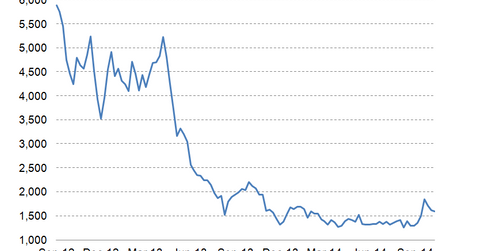The End Of Quantitative Easing Could Make Mortgage REITs Vulnerable
Big agency REITs like Annaly (NLY) and American Capital Agency (AGNC) took the chance to deleverage their balance sheets after the warning in the spring of 2013.
Nov. 20 2020, Updated 5:06 p.m. ET

Tapering is over. What about refinances?
Tapering didn’t surprise mortgage real estate investment trusts (or REITs). They had a chance to prepare. Big agency REITs like Annaly (NLY) and American Capital Agency (AGNC) took the chance to deleverage their balance sheets after the warning in the spring of 2013.
In terms of the footprint in the markets, it makes sense for the Fed to taper anyway, even without better employment data. Why? The end of the refinance boom. Once the refinance boom ended, mortgage issuance fell, and the Fed’s footprint increased. You can see from the chart below just how much the refinancing boom has dried up.
The discussions regarding what to do with the mortgage-backed security (or MBS) assets on the Fed’s balance sheet is important to mortgage REITs. The Fed has said that it will retain its MBS holdings. It will maintain its exposure through reinvesting maturing proceeds.
The Fed had discussed letting the portfolio run off in previous meetings. During the July meeting, the Fed discussed the possibility of selling its MBS paper. At the September meeting, it mentioned the idea again. In October, it didn’t discuss this issue.
The last thing the Fed wants to do is disrupt the mortgage market. However, it appears that if the Fed can offload some of its portfolio by selling it, then the Fed will consider this move. From the Fed’s standpoint, the interest rate on these bonds is well below current rates. Once rates increase, these securities’ prepayment speeds will collapse. They will take a long time to run off. Plus, as prepayment speeds fall, duration will increase. This means more risk of capital losses.
Effect on REITs
REITs like Annaly (NLY), American Capital Agency (AGNC), MFA Financial (MFA), Hatteras (HTS), and Capstead (CMO) could become vulnerable if the Fed decides to dump its portfolio of MBS onto the market. MBS spreads to Treasuries would widen, which would equate to capital losses. The Fed’s concern is what happens to mortgage rates and housing affordability. It isn’t concerned with what happens to mortgage REITs.
That said, pretty much everyone has deleveraged in a big way since the rates started increasing. Any further increases in interest rates will have less of an effect than they did during 2Q13.
